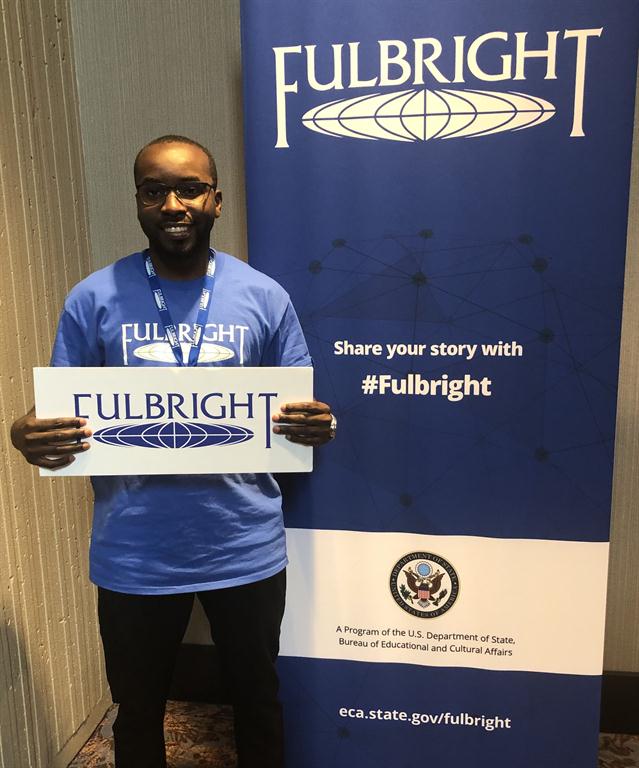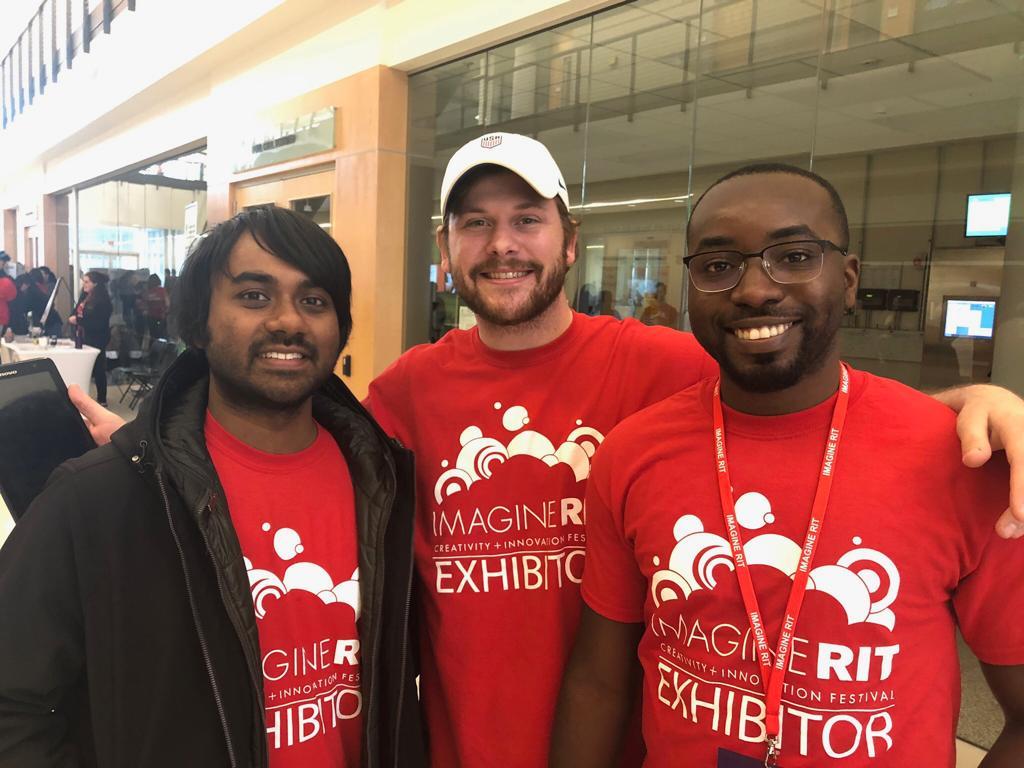From humble beginnings
Fearless sacrifices drive Kahupi’s success
Inamutila Kahupi has not allowed his disadvantaged background to hold him back.
Inamutila Kahupi
I am the second youngest of nine siblings. My uneducated parents could not afford to pay for my studies, but through my hard work and dedication, I have managed to pursue my engineering dream through successfully being awarded scholarships to complete my studies.
Today I have two degrees behind my name and I am pursuing a third - remarkably all through scholarships. My aspiring nature to continuously improve and develop myself was what drove me from a young age. I got that from my parents.
The Namibian education system was the foundation for my love of engineering and academics, and my passion for learning.
After matriculating from Canisianum Roman Catholic High School as one of the top students, I was awarded a scholarship to study environmental engineering in Beijing, China by the Namibian government and the Chinese Scholarship Council. I graduated and returned to Namibia to work at Namdeb and NamWater.
During my time at NamWater, South Africa and Namibia experienced one of the harshest drought periods and this led to scholarships being awarded to Namibians, in order to understand the water challenges by working with Namibian institutions to studying water engineering programmes. I am proud to have been the first Namibian student to study water resource engineering at the Namibia University of Science and Technology (Nust). During this time, one of my professors for hydraulic structures, Dr Bruce Gehrig, who was a visiting professor at the time from North Carolina in the United States, shared his Fulbright Scholarship experiences in Namibia with me.
This is how I ended up applying for the Fulbright Scholarship programme. My Fulbright award was to study in the US for a master of engineering: sustainable systems at one of the best universities (the Rochester Institute of Technology in New York). I was humbled to become a Fulbright scholar due to the fact that 37 Fulbright alumni have served as heads of state or government, 60 Fulbright alumni have been awarded the Nobel Prize, 72 Fulbright alumni are MacArthur Foundation fellows and 86 Fulbright alumni have received Pulitzer Prizes.
I am the first Namibian to study at the Rochester Institute of Technology (RIT) and this has pushed me to persevere even more and keep my country’s flag flying high. Studying at RIT has been the best experience of my entire academic journey. Being on campus from 09:00 to O2:00 has become the norm. However, the hard work has pushed me to want to achieve more.
This is why in addition to my studies I have been fortunate to have been able to take on different roles at RIT and at the Golisano Institute for Sustainability. I am current serving as the graduate student ambassador for the college, the vice-president of the Fulbright students at RIT, the sustainability chair of the Global Health Association at RIT and the marketing and communications assistant for the college.
My studies are one aspect of my experience, however, it would not be complete if I did not mention the networks, friendships and cultural experiences that play an important role in shaping me.
In March this year, I had the opportunity to attend the African Development Conference at the Kennedy School, which was hosted by Harvard University. This conference brought together various leaders across different sectors from Africa and the entire continent. Namibia was also represented.
During April, I took part in the Imagine RIT: Innovation and Creativity Festival hosted by the university. This was hugely inspirational because it is a campus-wide event that showcases the innovative and creative spirit of RIT students, the faculty and staff. It included interactive presentations, hands-on demonstrations, exhibitions and research projects set up throughout the campus.
I have lived in another country before, when I lived in China for almost six years. However the cultural differences are always different. Adapting to another country requires one to maintain your identity, but at the same time one must remain open-minded, focused on your goals and make the most of the experiences.
In addition to the time difference (it is about six hours) it can become extremely lonely and at times one can becomes homesick. Fortunately, I have a lot of family support and there is social media, which means that I can speak to loved ones or be informed of everything that is happening at home relatively quickly and easily. I also believe in making the most of my experiences, so one of the aspects that has helped to me to adapt is to learn as well as explore as much as I can about the country I am in, whenever it is possible. Fortunately, the language spoken is English, so I did not struggle to adapt as much as I struggled in China, because everything was in Mandarin, which meant I had to study it first. I am also much older and more mature in comparison to the time when I was in China. I remember using shampoo as body lotion and taking costly decisions when it came to supermarkets and malls in China.
Therefore, living in the US is definitely easier in comparison to the Chinese experience, but it comes with a lot of responsibilities. I learnt to be self-motivated and work many hours of the day to achieve my targets.
I am a Namibian at heart and home is where the heart is. There are indeed differences and the US has many things that we can learn from. However, it is a developed country and it would not be fair to compare. I therefore choose to apply my learnings of what is good and what is not so good, so that I can develop myself and my country.
The US education system is the most difficult one that I have ever experienced. I remember thinking this is why the university is ranked as one of the best in the world, because it requires so much work and deadlines for deliverables. Self-discipline is also an important quality, and everything depends on relationship-building and hard work.
When you think of many young people in Namibia, we wait for graduation before finding employment, which in most cases becomes difficult for students to transform themselves in such a short period. In the US, most students, even as young as 21, have had years of part-time work experience, and in most cases use those earnings to live on. The youth need to be pushed more and much harder in Namibia; I wish I was pushed harder back then. Life is really about survival of the fittest in large economies and when things are given to the youth without working hard for them, it cheats the youth of that work ethic and motivation that is required to maintain a high level of quality work and self-discipline.
Did you know?
Rochester Institute of Technology (RIT) was named one of the greenest universities in 2018 by the Princeton Review.
Facts about Kahupi:
· What you see is not what you get.
· He has strong family values and principles.
· He believes in a healthy body and healthy mind, therefore exercise is important.
· He has a passion for art (drawing/painting).
· He is energised by the unknown.
· If he believes in something, he stands his ground.
Inamutila Kahupi
I am the second youngest of nine siblings. My uneducated parents could not afford to pay for my studies, but through my hard work and dedication, I have managed to pursue my engineering dream through successfully being awarded scholarships to complete my studies.
Today I have two degrees behind my name and I am pursuing a third - remarkably all through scholarships. My aspiring nature to continuously improve and develop myself was what drove me from a young age. I got that from my parents.
The Namibian education system was the foundation for my love of engineering and academics, and my passion for learning.
After matriculating from Canisianum Roman Catholic High School as one of the top students, I was awarded a scholarship to study environmental engineering in Beijing, China by the Namibian government and the Chinese Scholarship Council. I graduated and returned to Namibia to work at Namdeb and NamWater.
During my time at NamWater, South Africa and Namibia experienced one of the harshest drought periods and this led to scholarships being awarded to Namibians, in order to understand the water challenges by working with Namibian institutions to studying water engineering programmes. I am proud to have been the first Namibian student to study water resource engineering at the Namibia University of Science and Technology (Nust). During this time, one of my professors for hydraulic structures, Dr Bruce Gehrig, who was a visiting professor at the time from North Carolina in the United States, shared his Fulbright Scholarship experiences in Namibia with me.
This is how I ended up applying for the Fulbright Scholarship programme. My Fulbright award was to study in the US for a master of engineering: sustainable systems at one of the best universities (the Rochester Institute of Technology in New York). I was humbled to become a Fulbright scholar due to the fact that 37 Fulbright alumni have served as heads of state or government, 60 Fulbright alumni have been awarded the Nobel Prize, 72 Fulbright alumni are MacArthur Foundation fellows and 86 Fulbright alumni have received Pulitzer Prizes.
I am the first Namibian to study at the Rochester Institute of Technology (RIT) and this has pushed me to persevere even more and keep my country’s flag flying high. Studying at RIT has been the best experience of my entire academic journey. Being on campus from 09:00 to O2:00 has become the norm. However, the hard work has pushed me to want to achieve more.
This is why in addition to my studies I have been fortunate to have been able to take on different roles at RIT and at the Golisano Institute for Sustainability. I am current serving as the graduate student ambassador for the college, the vice-president of the Fulbright students at RIT, the sustainability chair of the Global Health Association at RIT and the marketing and communications assistant for the college.
My studies are one aspect of my experience, however, it would not be complete if I did not mention the networks, friendships and cultural experiences that play an important role in shaping me.
In March this year, I had the opportunity to attend the African Development Conference at the Kennedy School, which was hosted by Harvard University. This conference brought together various leaders across different sectors from Africa and the entire continent. Namibia was also represented.
During April, I took part in the Imagine RIT: Innovation and Creativity Festival hosted by the university. This was hugely inspirational because it is a campus-wide event that showcases the innovative and creative spirit of RIT students, the faculty and staff. It included interactive presentations, hands-on demonstrations, exhibitions and research projects set up throughout the campus.
I have lived in another country before, when I lived in China for almost six years. However the cultural differences are always different. Adapting to another country requires one to maintain your identity, but at the same time one must remain open-minded, focused on your goals and make the most of the experiences.
In addition to the time difference (it is about six hours) it can become extremely lonely and at times one can becomes homesick. Fortunately, I have a lot of family support and there is social media, which means that I can speak to loved ones or be informed of everything that is happening at home relatively quickly and easily. I also believe in making the most of my experiences, so one of the aspects that has helped to me to adapt is to learn as well as explore as much as I can about the country I am in, whenever it is possible. Fortunately, the language spoken is English, so I did not struggle to adapt as much as I struggled in China, because everything was in Mandarin, which meant I had to study it first. I am also much older and more mature in comparison to the time when I was in China. I remember using shampoo as body lotion and taking costly decisions when it came to supermarkets and malls in China.
Therefore, living in the US is definitely easier in comparison to the Chinese experience, but it comes with a lot of responsibilities. I learnt to be self-motivated and work many hours of the day to achieve my targets.
I am a Namibian at heart and home is where the heart is. There are indeed differences and the US has many things that we can learn from. However, it is a developed country and it would not be fair to compare. I therefore choose to apply my learnings of what is good and what is not so good, so that I can develop myself and my country.
The US education system is the most difficult one that I have ever experienced. I remember thinking this is why the university is ranked as one of the best in the world, because it requires so much work and deadlines for deliverables. Self-discipline is also an important quality, and everything depends on relationship-building and hard work.
When you think of many young people in Namibia, we wait for graduation before finding employment, which in most cases becomes difficult for students to transform themselves in such a short period. In the US, most students, even as young as 21, have had years of part-time work experience, and in most cases use those earnings to live on. The youth need to be pushed more and much harder in Namibia; I wish I was pushed harder back then. Life is really about survival of the fittest in large economies and when things are given to the youth without working hard for them, it cheats the youth of that work ethic and motivation that is required to maintain a high level of quality work and self-discipline.
Did you know?
Rochester Institute of Technology (RIT) was named one of the greenest universities in 2018 by the Princeton Review.
Facts about Kahupi:
· What you see is not what you get.
· He has strong family values and principles.
· He believes in a healthy body and healthy mind, therefore exercise is important.
· He has a passion for art (drawing/painting).
· He is energised by the unknown.
· If he believes in something, he stands his ground.







Comments
Namibian Sun
No comments have been left on this article